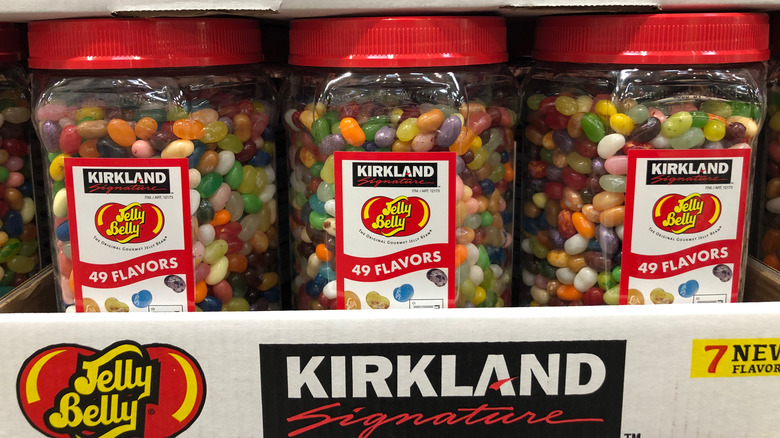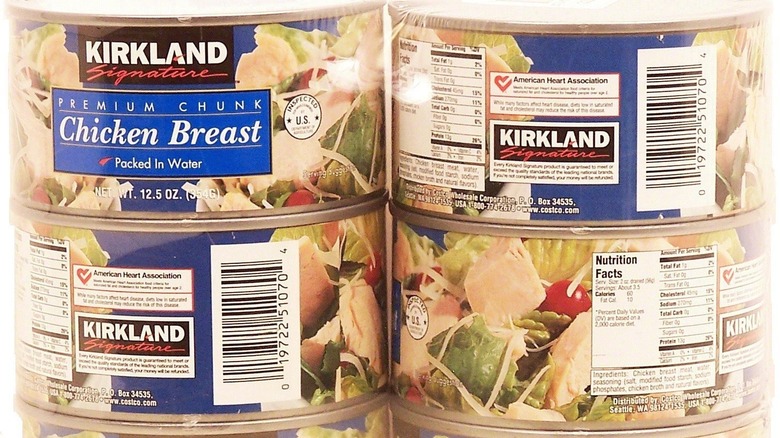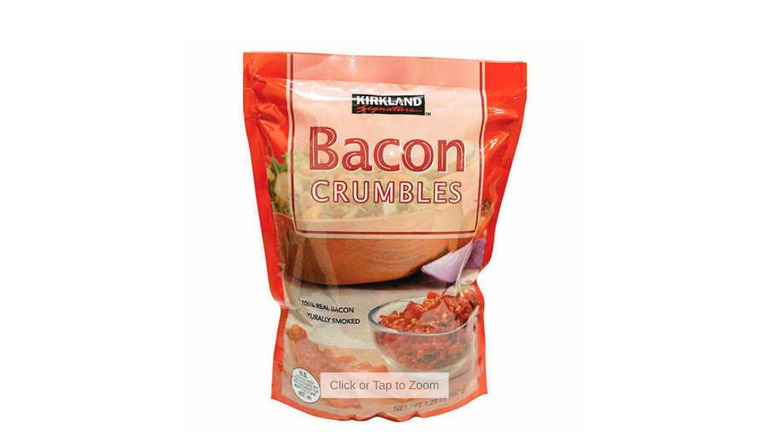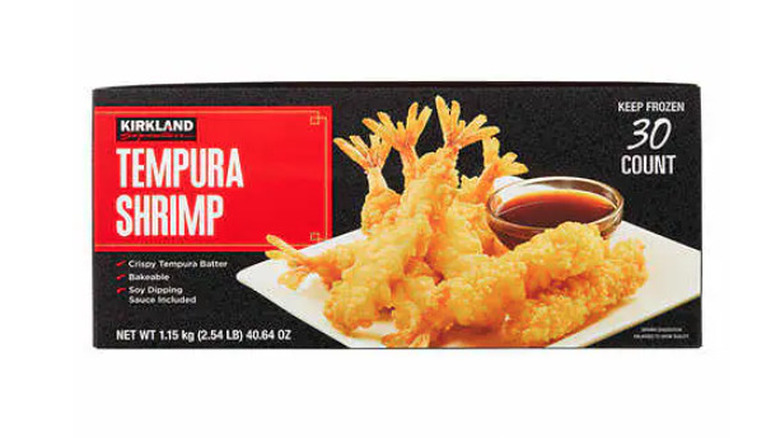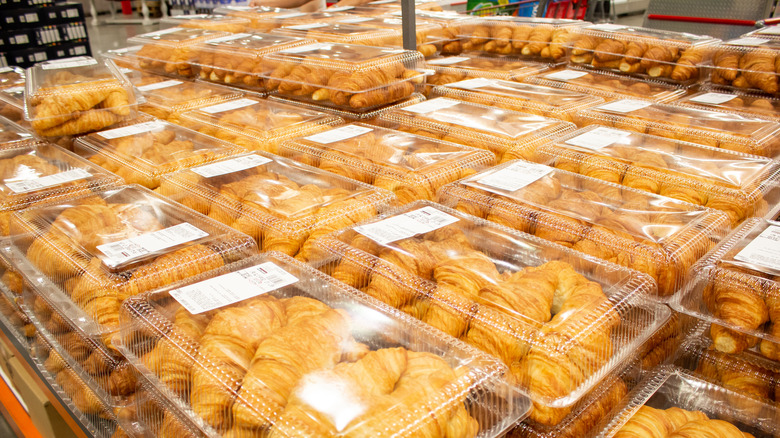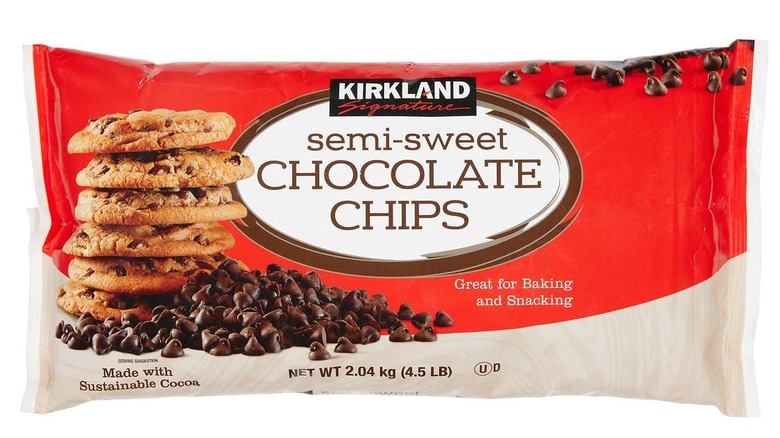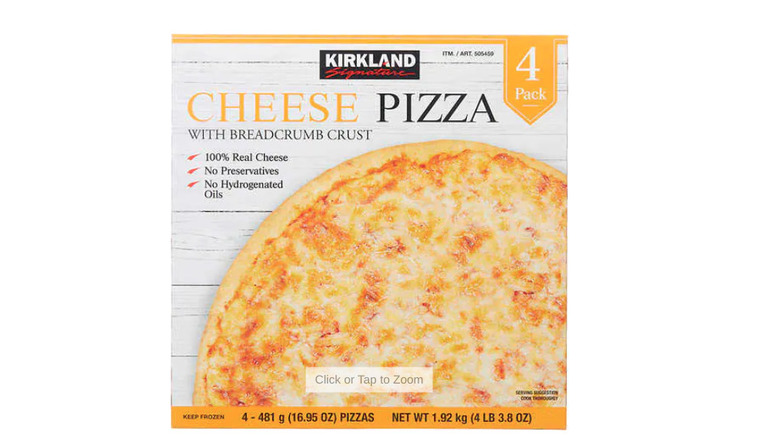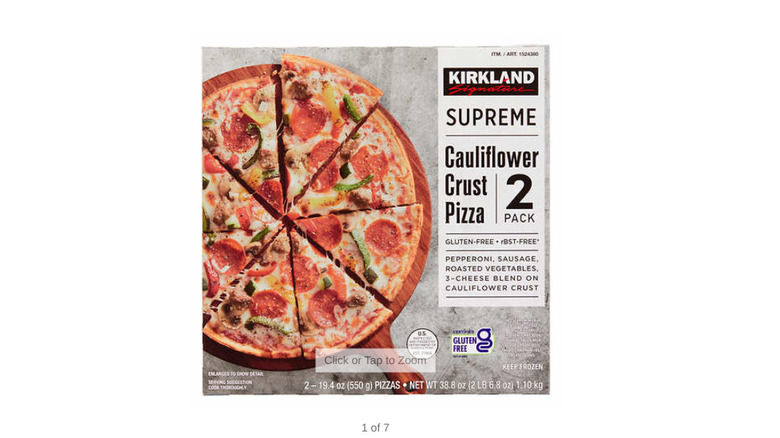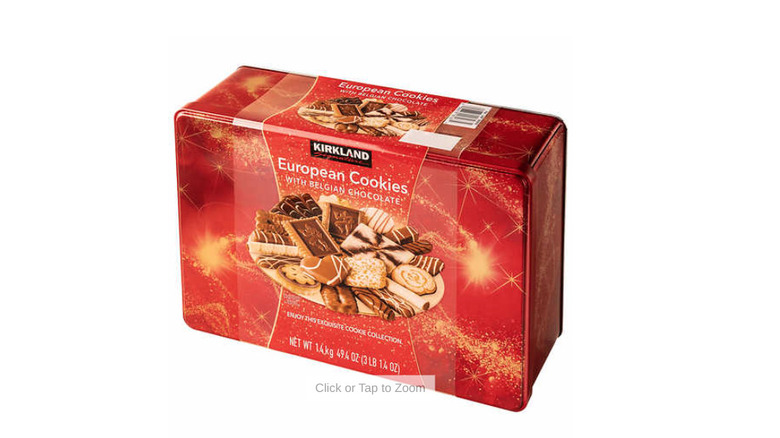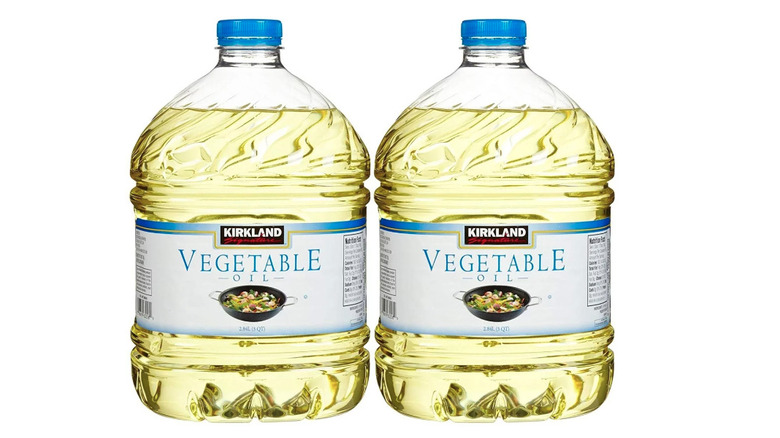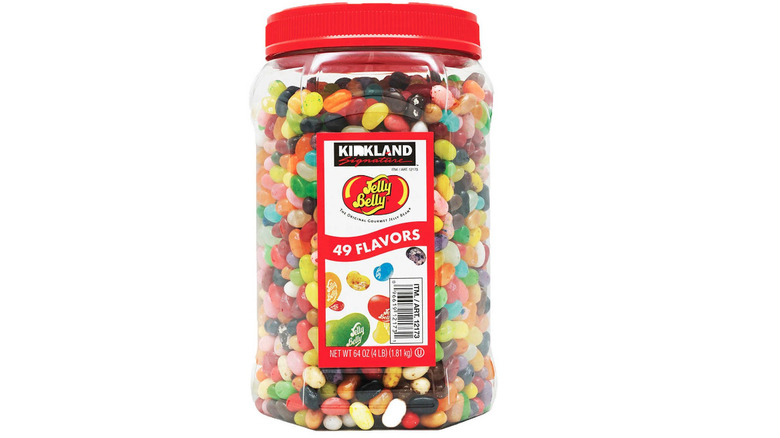The 10 Unhealthiest Kirkland Products, Ranked
We may receive a commission on purchases made from links.
Kirkland Signature products run the gamut all the way from batteries, golf clubs, and other household items to some popular favorite food items from fresh to frozen. Kirkland's collection of sodas, baked goods, vegetables, and much more has changed over the years, but it has always been one of Costco's private labels.
Because the brand is so recognized by bulk shoppers, it has almost become synonymous with the big box store and one of the most lucrative private labels out there. This careful marketing strategy was one that was carefully orchestrated back in 1995 and was meant to make great brands more affordable. Ultimately, this kept the prices low but the quality high. However, that doesn't mean every food item with a black, red, and white label is top tier.
In fact, Kirkland Signature has a few food items that are far from the healthiest options on the shelf. Everything from extremely high amounts of sodium to food dyes and harmful preservatives can be found on the ingredient labels of some of these well-known products.
Although Kirkland Signature has quite a few organic options and natural products to choose from, you should always be careful about reading the ingredients and nutrition facts if you want to make an educated choice. Unhealthy ingredients are often buried in the label or even marketed as something harmless. Kirkland Signature has some great options for healthy eating, but you might want to avoid some of the unhealthier products when stocking up.
1. Premium Chunk Chicken Breast
Canned chicken breast all on its own doesn't scream fresh and unprocessed, but the truth is it can really be a tempting way to cut back on prep time in the kitchen. A few cans of Kirkland Signature Premium Chunk Chicken Breast can make an easy chicken salad or a buffalo chicken dip a breeze, but the fact is that meat is difficult to keep fresh on the shelf for long periods of time.
It's the sodium phosphates that keep this item from going bad, but, unfortunately, they can really cut into your health. Sodium phosphate is just one of the many types of phosphates that are commonly found in processed foods in today's world. Processed foods are typically found in the center aisles of your grocery store, such as packaged, dried, and canned food that won't expire for long periods of time.
Sodium phosphate has technically been approved by the Food and Drug Administration, technically, but it has been labeled as somewhat of a concern for consumers. An excessive amount of this ingredient has been found to aggravate kidney disease, worsen heart disease, and possibly lead to higher blood pressure.
Canned chicken has thirteen grams of protein, so it can add some nutrition to your diet in a pinch, but if you're frequently incorporating this into your menu, you might want to opt for frozen chicken breasts or something fresh from the butcher.
2. Bacon Crumbles
Bacon crumbles are often found at salad bars to add a bit of crunch and a little flavor to your meals. They also taste great on top of a baked potato or sprinkled over corn chowder. The tiny pieces of cooked bacon might not seem any more unhealthy than regular bacon, but the sodium nitrate preservative and high levels of salt in small portion sizes are quite concerning.
This particular brand of bacon bits does not contain any food coloring, but the sodium nitrates listed on the ingredient label are an ingredient that keeps cured meat vibrant and red. Without the addition, those bacon crumbles would become unsightly and unappetizing on the shelf. Sodium nitrate isn't harmful to people at first and even exists naturally in some vegetables; however, slowly, over time, as it sits on the shelf in your pantry or in a store, it breaks down and becomes a dangerous chemical that has been linked to cancer.
The chemical is so unhealthy that the USDA actually made it mandatory to warn customers about the hazards on the label. The bacon crumbles are an easy way to add some excitement to a boring salad, but they are low in protein and high in sodium. If you really want that added salty crunch, consider cooking up a few pieces of fresh bacon or finding a nitrate-free alternative.
3. Tempura Shrimp
Many types of seafood can be difficult to find fresh in parts of the world and during certain times of the year. On top of that, battering and frying up a fresh shrimp can be a long cumbersome project in the kitchen. This is why you might be tempted to snatch up a box of Kirkland Signature Tempura Shrimp for a family dinner or an appetizer on game night. You might want to think again. This product is high in fat and salt and low in nutrition. The dipping sauce alone has 230 milligrams of sodium.
One serving of this shrimp is only three pieces, and there are about ten servings in one box. If you were to eat only two servings, then you would be consuming 40 percent of your recommended daily sodium intake. Just one serving of this shrimp has 460 milligrams of sodium, and with one tablespoon of dipping sauce, you're up to about 700 milligrams in one meal.
These appetizer snacks simply do little to serve you nutrition-wise. They don't provide a lot of protein or fiber, and even the carbohydrates are high, which could leave you feeling hungry after eating. Although this frozen option could be slightly healthier than a deep-fried appetizer at your local grill, it is still lacking. Consider forgoing the dipping sauce and controlling your portion size if you already have this product in the freezer.
4. Butter Croissants
Buttery and satisfying croissants are loaded with simple carbohydrates and fat, which makes it an empty treat that provides no real nutritional value. The high amounts of sodium, the one tiny gram of fiber, and thirty grams of carbohydrates make this a heavy, unsatisfying addition to your day.
These croissants might add some extra flare to your morning routine or prove a tasty midnight snack, but there are eleven grams of saturated fat, which can lead to inflammation in the body and leave you feeling tired or sluggish rather than energized.
Additionally, .5 grams of trans fat can be found in one serving of these croissants. Trans fats are even more unhealthy than saturated fats, and the Food and Drug Administration has actually taken serious steps to remove them from most processed foods in the United States. Other countries have banned them altogether. Although there is only a small amount of trans fat in these croissants, a little can add up over time and lead to big health problems.
Even small amounts of trans fat have been tied to heart disease and could also greatly increase your risk of diabetes. Even more so, trans fat has been known to damage the vessels throughout your body and potentially lead to cancer and other diseases. If these Kirkland croissants are a regular on your menu, you might want to opt for a healthier alternative or cut back to reduce your trans fat intake.
5. Semi-Sweet Chocolate Chips
Chocolate chips are often a pantry staple that's frequently on hand for baking and snacking, and you might think that a small amount is no big deal. However, Kirkland Signature's brand has more than just chocolate and sugar on the ingredients label. One tablespoon, about 8-10 chips, has 8 grams of sugar, which doesn't seem like a lot in the grand scheme of desserts, but sugar is the first ingredient in these chocolate chips, which means there's more weight in sugar than chocolate in these chocolate chips.
Chocolate is probably not your go-to healthy snack in the first place, but these are not harmless even compared to all of the other snacks and junk food available. That's because natural flavors have been tacked on to the end of the label. The term natural flavors is a catch-all, which means companies don't have to disclose what makes up the combination. The majority of these flavors are designed to make you want more and more of the food, even if it's unhealthy for you.
This can make portion control difficult. Finally, most natural flavors are made up of preservatives and additives that are chemicals that have been linked to cancer and other health concerns. These chocolate chips have next to no nutritional value, with one tiny gram of protein, added sugar, and no calcium or vitamin D.
6. Cheese Pizza
Frozen meals tend to get a bad reputation. Although some companies are making strides toward healthier options, Kirkland Signature's frozen pizza is a sad stereotype of too much sodium and only one measly gram of fiber, which places it among some of the unhealthiest options of Kirkland Signature products.
Despite the many checkmarks on the front of the box vowing that there are no preservatives or hydrogenated oils and that the cheese is real, just one-fourth of this pizza accounts for twenty-nine percent of your recommended daily sodium intake.
The average adult should consume less than 2,300 milligrams of sodium per day. This means if you have two serving sizes or any other sodium with your pizza, such as dipping sauce, garlic bread, or other salty side dishes, you could be consuming almost all of your allocated sodium in just one meal.
Too much sodium is bad for your health because it basically makes your body thirsty. The sodium calls the water in your body into your bloodstream to balance out the salt. This, in turn, spikes your blood pressure, which can overwork your heart and negatively affect all the organs in your body.
Who needs a snack that's going to hurt your body rather than give it energy and nourish it? Skip this frozen meal and opt for something a little less salty. If you are going for this option, you might want to add something with potassium to combat the resulting high blood pressure.
7. Supreme Cauliflower Crust Pizza
Speaking of too much sodium, don't be fooled by the Kirkland Signature Cauliflower Crust Pizza, Supreme. Kirkland Signature's Cauliflower Crust Pizza might be gluten-free, but it is packed with a whopping serving of 900 milligrams of sodium, which means that just a quarter of this pizza almost contains a whole day's worth of your sodium intake. Additionally, the saturated fat in just one serving size is almost half of your day's worth of fat.
Saturated fat is much better than trans fat, and they do often occur naturally in dairy and in some meats, such as sausage and pepperoni. But the cliche that too much of anything is bad for you rings true. The average adult should actually only have about 13 grams of saturated fat per day. Excessive amounts of bad fats, such as what's found in this pizza, can negatively affect your cholesterol and lead to poor heart health. If this pizza is on the menu, keep the portion size on the small side to avoid the high levels of both sodium and fat.
8. European Cookies with Belgian Chocolate
Kirkland Signature European Cookies contain fifteen types of chocolatey, buttery, soft, and crunchy cookies that seem perfect for the holiday season or any other type of celebration when you don't feel like baking but want to offer a little something for everyone. Unfortunately, these cookies might taste delicious, but when it comes to your health, they are very low on nutritional value.
In fact, this assortment is loaded with sugar, with thirteen grams in four cookies. It's recommended that the average adult only consume about 24 grams of sugar in a whole day, so these cookies are about half of your daily intake. Sugar is quickly followed by vegetable shortening on the ingredients list, which is another name for vegetable oil that has been solidified. Also buried in the list of ingredient is natural flavors.
However, one of the most concerning ingredients is the ammonium bicarbonate, which is considered an extremely hazardous substance that is found in fire extinguishers. This substance is toxic when breathed in, but it's still listed as an ingredients in many food products. Contact with ammonium bicarbonate can cause skin and eye irritation and serious breathing troubles. Unfortunately, it is quite commonly found in baking powders and in these particular cookies.
9. Vegetable Oil
Anything that is 100 percent pure and contains the word vegetable can't be that bad for you, right? Unfortunately, no. Food manufacturing companies long ago mastered the art of marketing and can make just about anything sound positive. Even though Kirkland Signature Vegetable Oil only has one ingredient on the nutrition label, it is still full of chemicals and unhealthy fats that can cause major health problems with prolonged use.
Vegetable oil is another catch-all term that encompasses most oils that are made from plants and grains. The biggest problem is that manufacturers use a ton of chemicals in the process of drawing the oil out of the grains. They also heat and treat the oil with even more chemicals to make it smooth, give it a nice color, and even deodorize it to make it smell good.
These are chemicals that we would never be comfortable consuming because they have so many negative health effects. The chemicals and the actual oil after it's treated can cause inflammation in your body, is bad for your arteries and heart, and can cause your cells to mutate.
The omega 6s found in vegetable oil can contribute to cancer cells in your body and make them mutate even faster than normal. Cooking with vegetable oil is so last season. There are a ton of healthier alternatives that do not involve so many chemicals and nasty side effects, such as organic butter, ghee, and extra virgin olive oil.
10. Jelly Belly Variety Pack
Kirkland Signature Jelly Bellys provide next to no nutritional value. They're made mainly from sugar, but they also contain harmful dyes such as Red 40, which has been linked to cancer and other side effects. This makes them among the unhealthiest of Kirkland Signature products. Red 40 is an entirely unnatural ingredient and is made from crude oil, commonly known as petroleum. Let's not forget that petroleum is a fossil fuel that is used to make gasoline and other fuels.
This product has a lot of the same notes as other items on the list. The first and most prevalent ingredients are sugar and corn syrup. It also contains natural flavors and artificial flavors, and they're not even last on the list. But most importantly, these jelly beans contain ten different types of food coloring and dyes to give them that rainbow appearance.
Red no. 3, red dye 40, and yellow no. 5. have all been linked to hyperactive behavior and more, especially in children. It's often recommended to remove these dyes from children's diets to help with hyperactivity and inattention. It's best to avoid this product.
